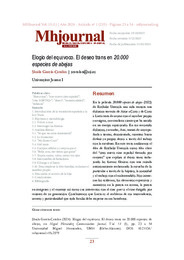Por favor, use este identificador para citar o enlazar este ítem:
https://hdl.handle.net/11000/32059Registro completo de metadatos
| Campo DC | Valor | Lengua/Idioma |
|---|---|---|
| dc.contributor.author | García-Catalán, Shaila | - |
| dc.date.accessioned | 2024-05-06T08:01:06Z | - |
| dc.date.available | 2024-05-06T08:01:06Z | - |
| dc.date.created | 2024-01-31 | - |
| dc.identifier.citation | Miguel Hernández Communication Journal Núm.15 (2024) | es_ES |
| dc.identifier.issn | 1989-8681 | - |
| dc.identifier.uri | https://hdl.handle.net/11000/32059 | - |
| dc.description.abstract | En la película 20.000 especies de abejas (2023) de Estibaliz Urresola una niña transita una dolorosa travesía: de Aitor a Coco y de Coco a Lucía trata de acotar con el nombre propio su enigma, su extrañeza: siente que ha nacido en un cuerpo equivocado. En ese recorrido doloroso, su madre, Ane, tratará de acompañarla a tientas, desorientada, mientras busca definir su propio deseo a través del trabajo con la escultura. En este texto analizamos el film de Estibaliz Urresola como film clave del “otro nuevo cine español firmado por mujeres” que explora al deseo trans trabajando las formas fílmicas con una mirada autoconsciente reclamando la escucha de lo particular a través de lo háptico, la sororidad y el trabajo con el malentendido. Nos interesan los estilemas, los elementos expresivos y narrativos en la puesta en escena, la puesta en imágenes y el montaje así como sus intertextos con el cine queer o el cine dirigido por mujeres de su generación. Concluiremos que Lucía es el emblema de esa trascendencia, secreto y particularidad que toda familia debe respetar en sus herederos. | es_ES |
| dc.description.abstract | In 20,000 species of bees (2023) by Estibaliz Urresola a girl goes through a painful journey: from Aitor to Coco and from Coco to Lucía she tries to define with her own name the enigma she feels in the face of her strangeness: she feels that she has been born in a wrong body On this painful journey, his mother, Ane, will try to accompany him gropingly, disoriented, while he seeks to define his own desire through working with sculpture. In this text we analyze the film by Estibaliz Urresola as a key film of “another new Spanish cinema signed by women” that attends to trans desire by working on film forms in a self-conscious way, demanding listening to the particular through haptics, sorority and work with misunderstanding. We are interested in the stylems, the expressive and narrative elements in the staging, the putting in images and the editing as well as their intertexts with queer cinema or cinema directed by women of their generation. We will conclude that Lucía is the emblem of that transcendence and secret that every family must respect in the heirs. | es_ES |
| dc.format | application/pdf | es_ES |
| dc.format.extent | 32 | es_ES |
| dc.language.iso | spa | es_ES |
| dc.publisher | Universidad Miguel Hernández de Elche | es_ES |
| dc.rights | info:eu-repo/semantics/openAccess | es_ES |
| dc.rights | Attribution-NonCommercial-NoDerivatives 4.0 Internacional | * |
| dc.rights.uri | http://creativecommons.org/licenses/by-nc-nd/4.0/ | * |
| dc.subject | directoras | es_ES |
| dc.subject | otro nuevo cine español | es_ES |
| dc.subject | cine LGBTIQ+ cine | es_ES |
| dc.subject | deseo | es_ES |
| dc.subject | transexualidad | es_ES |
| dc.subject | infancia | es_ES |
| dc.subject | Women directors | es_ES |
| dc.subject | another new Spanish cinema | es_ES |
| dc.subject | LGBTIQ+ cinema | es_ES |
| dc.subject | desire | es_ES |
| dc.subject | transsexuality | es_ES |
| dc.subject | childhood | es_ES |
| dc.subject.other | CDU::3 - Ciencias sociales | es_ES |
| dc.title | Elogio del equívoco. El deseo trans en 20.000 especies de abejas | es_ES |
| dc.type | info:eu-repo/semantics/article | es_ES |
| dc.relation.publisherversion | https://doi.org/10.21134/ mhjournal.v15i.2079 | es_ES |

Ver/Abrir:
fsabater,+2079-Texto+del+artículo-9522-1-11-20231205_REVISADO.pdf
6,19 MB
Adobe PDF
Compartir:
 La licencia se describe como: Atribución-NonComercial-NoDerivada 4.0 Internacional.
La licencia se describe como: Atribución-NonComercial-NoDerivada 4.0 Internacional.
.png)